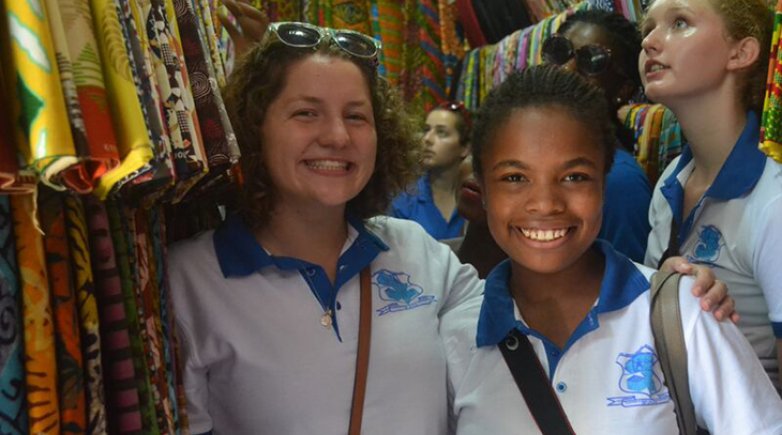Three Months in Ghana
Exonians embark on PEA’s first term-abroad program in Africa.
Last autumn, six Exonians mastered the art of hand-washing their clothes and hanging them on a line to dry. They grew accustomed to cold showers at 5:30 a.m., to uniforms they were required to iron daily, to pre-breakfast room inspections, and meals composed largely of rice. Stepping away from the Harkness table, they also learned how to contribute to lecture-style classes in a respectful way without dominating discussions. And they discovered the ambiguity of what it means to be American when looking through a different cultural lens.
They bartered for beads in a crowded marketplace and tried to decipher homework assignments. A world away from Exeter in many respects, the six Exonians who participated in the Academy’s inaugural term-abroad program in Ghana, Africa, would do it all again, without question.
“When you talk about a cultural experience, what better continent is there to visit?” says program participant Shaquille Brown ’14, of Kingston, Jamaica. Alongside her peers, Brown made new friends from across Africa; studied literature, history and geography from an African perspective; toured Ghana; and routinely took part in community service projects, all while negotiating her role as a global citizen.
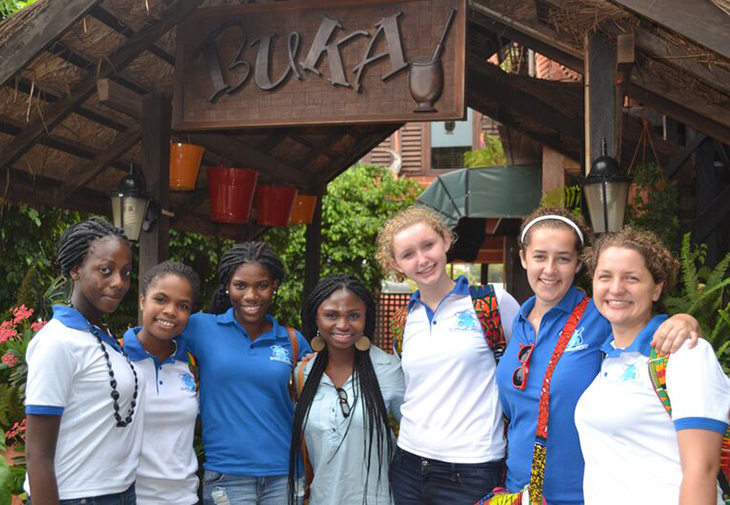
To leave campus, to reckon with one’s place in the world, and to be challenged by viewpoints and customs entirely foreign to your own is not a new concept or opportunity for Exeter students. A co-sponsor of the 50-year-old School Year Abroad program, Exeter began its formal global outreach in 1967 by providing Exonians with the chance to study in Rennes, France. Since then, locations have multiplied, and now more than 50 Exonians leave campus each year to study in 11 countries and two domestic locations. It is a global curricular program unmatched by peer schools, and yet—until recently—it did not include one of the world’s largest and most diverse continents.
“We needed a program in Africa to broaden the global outreach of our students by exposing them to the opportunities and challenges that continent presents in this era of globalization,” says Kwasi Boadi P’09, the Michael Ridder ’58 Distinguished Professor in History, who initiated the Africa study-abroad effort.“Such exposure helps break down the cultural barriers and stereotypes that have been the lot of Africa for the last couple of centuries.”
South Africa was an obvious location for an off-campus program, but Boadi says that would have meant “following the bandwagon.”At the same time, a number of other African countries continue to be volatile and unsafe. Boadi’s native country, Ghana, is relatively tranquil by comparison—even in the wake of divisive political outcomes and court rulings, social order remains intact. With the possibility of a program in mind, Boadi traveled to Ghana and Morocco in June 2011 on a faculty professional development trip with nine Exeter faculty members and 14 colleagues from the Punahou School in Hawaii. He was disheartened, however, to find that the public schools, which were quite solid in his youth, had since deteriorated (and were below Exeter’s high academic standards) as a result of the country’s post-independence economic crisis.
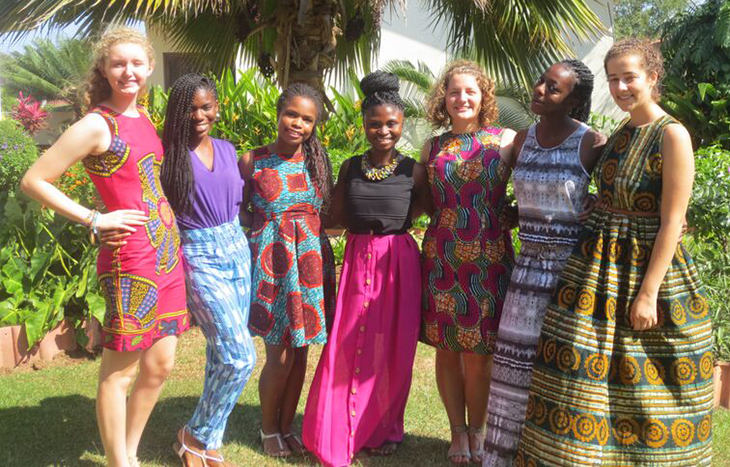
The solution emerged in April 2012 when Boadi met Titi Ofei, the principal of Ghana’s SOS-Hermann Gmeiner International College, who was at Exeter for an annual meeting of the heads of schools from the world’s leading independent schools. SOS-HGIC—with about 350 students, half of whom are not native Ghanaians—is a college-preparatory school that combines a philosophy of internationalism with a commitment to “uplift Africa” through active community service. It’s part of the International Baccalaureate program, which guarantees strict academic standards and other requirements, with nearly 100-percent postgraduate enrollment in universities and colleges around the world. It is located in Tema, 20 minutes outside of the capital, Accra. Following his meeting with Ofei, Boadi traveled to Ghana to scout SOS-HGIC, and he was “blown away” by the school—its upscale campus and state-of-the-art facilities in particular. Returning to PEA, Boadi wrote a report to the faculty body that was approved, establishing the new term-abroad program—the first U.S. exchange program at SOS- HGIC—for a small cohort of seniors, chosen based upon their application.
The six pioneers viewed their decision to travel to Ghana—in the words of Tina Safford ’14, of Exeter, NH—as “the beginning of a whole new exploration,” both academically and culturally.
“Even waking up at 5:30 every morning was wonderful—a real change of pace,” says Katharine Callahan ’14, of Kirkland,WA, laughing at the implausibility of her own comment. At SOS-HGIC, the days are full, starting with that early wake-up call. Before 6:10 a.m., all students are expected to iron their uniforms, make their beds, clean their closets, and get dressed and ready for classes. A faculty member then makes the rounds, and if the room is not up to snuff—if it’s not swept and tidy, the closets neatly organized—then the student is required to stay back and continue cleaning, risking arriving late to breakfast.
All students live in open and airy “hostels” on a campus that’s a 15-minute walk from the academic center. The Exonians stayed in hostels that consist of five small houses, with two rooms per house—others are more like large apartments. In pairs, they shared one of the two rooms, with the second occupied by a permanent student.
“Living with students there was an important pull factor,” says Safford, and the others agreed that they made good friends in their hostels and classes, and at school-sponsored events that included movie nights,“dance battles,” game nights and talent shows. It was an opportunity to get to know kids from parts of Africa including Uganda, Swaziland and Ethiopia that aren’t always well represented on the PEA campus.
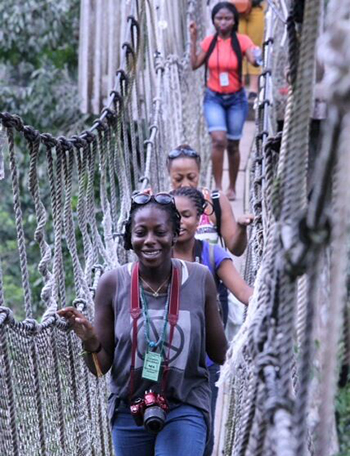 “They’re so different,” says Olamide Ogunbambo ’14, of Valencia, CA, of the two schools. “The only things they have in common are that the kids are bright and motivated, and they’re both coed.” Although she has enjoyed her four years at PEA, Ogunbambo, who is half-Nigerian, had originally hoped to attend a secondary school outside the United States. With an interest in African history and modern African affairs, Ogunbambo recognized that the term abroad in Ghana would allow her a unique opportunity to study standard academic subjects “from an African perspective rather than the typical American perspective,” particularly English and history.
“They’re so different,” says Olamide Ogunbambo ’14, of Valencia, CA, of the two schools. “The only things they have in common are that the kids are bright and motivated, and they’re both coed.” Although she has enjoyed her four years at PEA, Ogunbambo, who is half-Nigerian, had originally hoped to attend a secondary school outside the United States. With an interest in African history and modern African affairs, Ogunbambo recognized that the term abroad in Ghana would allow her a unique opportunity to study standard academic subjects “from an African perspective rather than the typical American perspective,” particularly English and history.
Brown shared that outlook. In Ghana, she studied slavery for the third time in her academic career and discovered how many sides there can be to one story. Brown says she first learned about slavery in Jamaica, from the West Indian perspective—a victim’s narrative that she initially accepted as the only truth. At PEA in upper-year U.S. History, she examined the economic impact of slavery, which helped her to understand how it had become such an essential component of the American economy, particularly in the South. But in Ghana, Brown considered slavery from the perspective of the people who first lost their sons, daughters and other family members to the slave trade. She learned about the origins of enslavement, tribal rivalries and raids, and the negative role of the slave trade in West African economic development.
“It hasn’t been repetitive,” says Brown. “It’s almost like a puzzle, and every country gave me a different set of pieces and clues. Each point of view builds off the others to present a complete picture of what slavery was like. As a history student and an Afro-West Indian, learning about the slave trade in such a holistic way is a quality experience.”
Ogunbambo, Safford and Emily Palmer ’14, of Exeter, NH, studied Kiswahili, which Ogunbambo says she hopes to use in future travels to eastern Africa. Otherwise, academic subjects were largely familiar territory, with six classes in science, math, literature and history, each meeting for 80 minutes two to three times per week. Yet, says Director of Global Initiatives Eimer Page, it was not the same old thing.
“It was an adjustment, but they entered into it with an amazing spirit,” Page says, noting that one of the six, Ade Ajanaku ’14, of Chicago, IL, even wanted to extend her stay through the winter term. “They gained an incredible perspective looking at some of these events from a different continent and a different teaching method.” They concur that they were acutely aware of the latter.
“I appreciate Harkness a lot more,” says Callahan. She knows the lecture style at SOS-HGIC is what she is likely to experience in college,“so it’s good that we had the chance to get used to that, but it also made me appreciate Harkness. I knew that going back, I’d be excited to engage more in classroom conversation.”
In October, Brown and Ogunbambo were invited to take part in a conference sponsored by the University of Ghana’s Institute of African Studies, “Revisiting the First International Congress of Africanists in a Globalised World.” The two wrote about their maternal great-great-grandmothers as part of SOS-HGIC’s presentation at the conference.
“Being chosen to represent SOS-HGIC as a voice from the diaspora was a great honor,” says Brown.“It was a privilege to share with professors and intellectuals the few African traditions that have been passed down in my family. It also pushed me to really think and dig deep into my ancestry.” For her part, Ogunbambo was grateful for the opportunity to speak with professors at the institute about Pan-Africanism, a movement that began in Ghana and a topic in which she’s deeply interested.
Community service is an important component in the SOS-HGIC curriculum. Its Creativity Action Service (CAS) programme, which Brown likens to PEA’s Exeter Social Service Organization (ESSO), is required of all students, and gives them the opportunity to select from among a variety of projects, which they complete with a grade-level group. Safford’s group’s handsewn brooches and bows were sold to raise money for the community, while Palmer was named editor of the news section of the school’s paper. SOS- HGIC students are expected to participate weekly, with supplemental large-scale monthly service trips; in the past, those have included bringing libraries to underserved communities, and building nursery and primary school blocks and latrines. In October, the CAS groups went to two area schools for the deaf, where they helped students practice English grammar patterns in sign language; in November, they all visited the SOS Children’s Village to help young students—the majority of whom are orphans or in foster care—with homework, play games, or do arts and crafts projects. The Exonians also took advantage of October’s midterm break, traveling as a group with other international students on a guided tour of Koforidua, Kumasi, and Cape Coast, before heading to Bonwire, a kente-weaving village; the Cocoa Research Institute of Ghana; Kakum National Park; and Elmina Castle, a trading outpost and the final stop for slaves before they boarded ships and left the country. During their term, they also enjoyed homestays with students during one SOS-HGIC exeat— a Saturday overnight away from school. Safford went home with a student who lives in Accra with her moth- er, a physician, while Palmer went home with the principal’s daughters.
Palmer says the time in Ghana was “eye-opening on so many levels.” During a visit to the market in Accra, for example, Palmer encountered vendors who didn’t hesitate to grab her by the arm to interest her in their wares. And at a girls-only meeting about personal hygiene one evening at school, Palmer observed that students were “brutally honest” in their comments to each other, more so than she would have expected to see at home.
While the society, values and role of religion in Ghana had an impact on the Exonians, in return, they tried to share a little about the United States at a couple of schoolwide events:The first was during orientation, where students were separated into groups by native country and asked to perform in a way that represented their culture. A few Ghanaian students were assigned to other countries’ groups, including the United States’, but Safford says no one chose it voluntarily.
“So many people wanted to go to America,” she says, “but no one necessarily wanted to be American.” Palmer says the group took the time to discuss with their temporary fellow Americans the concept of the “melting pot,” the importance of the environmental and feminist movements in the United States, and the economic troubles of the last five years. Together they sang “This Land Is Your Land,” but coming on the heels of a presentation by the Jamaican students that mentioned factory pollution from U.S.-based countries, they felt somewhat self-conscious representing the U.S.
“The biggest questions were,‘What is an American?’ and ‘What is America?’ ” says Safford of the three months in Ghana. “The identity of being an American was the thing students questioned us most about.” It played out in ways both big—the pollution accusation—and small. Palmer, who kept a blog during her stay, reports a conversation with a male student who asked if movie representations of American universities are accurate, noting that they always include “the football star and the cheerleaders.” (She assured him there’s more to it, a message that was reinforced by campus visits from students at U.S. colleges.)
By National Day, a once-a-semester event when students make presentations to the school and cook food representative of their countries, they had some lighthearted answers. Whipping up a “meal” of banana bread, macaroni and cheese, and caramel popcorn, the six Exonians did a mash-up dance that included “Cotton Eye Joe” and “Y.M.C.A.”
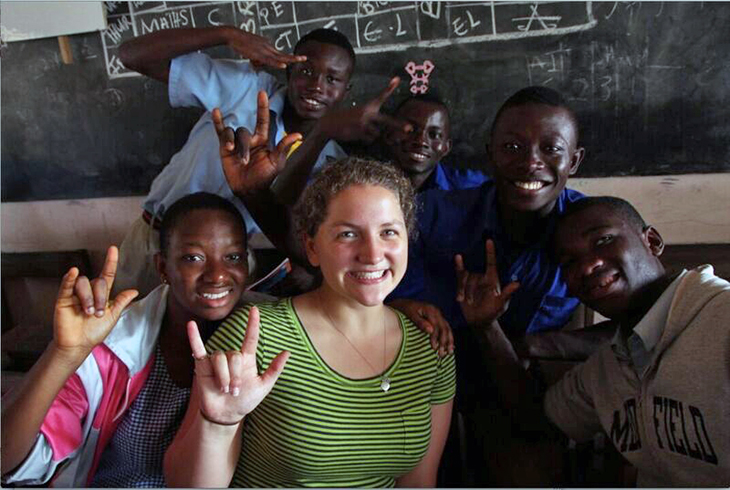
PEA Senior Tina Safford with students at a school for the deaf, where she helped them practice signing in English grammar patterns.
The students who took part in the inaugural program in Ghana admitted that they didn’t know much about the country and even less about the school before applying, but are looking forward to making a winter presentation to Exonians who are interested in next year’s program. The best candidates are those with some interest in Africa, social justice and travel, with a strong academic record.
“This is not just going to Africa and doing community service,” says Boadi.“It’s a rigorous program.”
More than anything, however, the term has given these students the chance to reflect, which can only come from stepping away from the familiar.
“It was an eye-opening experience personally, in our own growth and maturity,” says Callahan of the time in Ghana,“but also in how we interact with others, and in how we see America and the rest of the world.”And as technology makes the world feel smaller, she adds, the importance of connecting and interacting with other cultures in programs such as this will only continue to grow.
